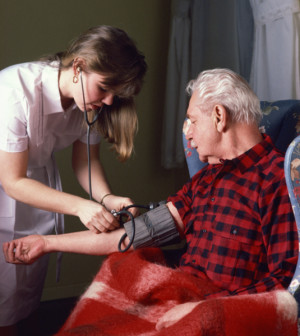- 10 Strategies to Overcome Insomnia
- Could Artificial Sweeteners Be Aging the Brain Faster?
- Techniques for Soothing Your Nervous System
- Does the Water in Your House Smell Funny? Here’s Why
- Can a Daily Dose of Apple Cider Vinegar Actually Aid Weight Loss?
- 6 Health Beverages That Can Actually Spike Your Blood Sugar
- Treatment Options for Social Anxiety Disorder
- Understanding the Connection Between Anxiety and Depression
- How Daily Prunes Can Influence Cholesterol and Inflammation
- When to Take B12 for Better Absorption and Energy
Awareness of Memory Problems Fades a Few Years Before Dementia: Study


Older adults destined to develop dementia may start to lose awareness of their memory problems two to three years before the disease is full blown, a new study finds.
That had been suspected, but not clearly shown before, said lead investigator Robert Wilson, senior neuropsychologist at the Rush Alzheimer’s Disease Center in Chicago.
“As researchers, we’re very interested in what the experience of dementia is like for the individual,” Wilson said. “It’s important to understand its natural progression.”
The findings also offer some useful information for the average person, according to Wilson.
“If you’re aware enough to be worried about your memory, you probably don’t have dementia,” he said. Nor is it clear that you ever will, since memory issues do not mean a person is doomed to develop Alzheimer’s or other forms of dementia.
The findings, published in the Aug. 26 issue of Neurology, are based on nearly 2,100 older adults who were assessed annually for over a decade. They took standard tests of memory and thinking skills, and gave their own opinions of their mental sharpness, answering questions such as, “How often do you have trouble remembering things?”
Overall, 239 people were diagnosed with dementia during the study period. Wilson’s team found that their awareness of their own memory problems began to fade two to three years before the onset of dementia, on average.
Defining the onset of dementia is not clear-cut, according to Wilson. But, he said, it is based on more than just memory loss: People with dementia also typically have problems with language, concentration and planning, and may often become confused about the day or month, or where they are.
The new findings give support to what doctors and researchers have believed to be true, said David Morgan, director of the Signature Program in Neuroscience at the University of South Florida College of Medicine, in Tampa.
“This is something we’ve been aware of,” said Morgan, who is also a spokesperson for the American Federation for Aging Research. “There’s a saying in the field that if you know you have memory problems, then you don’t have dementia.”
But this study, he said, offers a “rigorous analysis” of the issue.
The findings have some clear implications, according to Morgan. “If you don’t think you have a problem, you’re unlikely to seek help,” he said. “So, it’s important for relatives to be sensitive to signs of dementia.”
Wilson agreed. If mom sometimes misplaces her keys, there’s no need to rush to the doctor, he said. But if she’s showing a pattern of memory lapses — and seems unaware of it — that would be a red flag, he said.
Morgan noted that under the recent health care law, Medicare must now cover screening tests for cognitive impairment.
“But in practice,” he said, “that may amount to the doctor asking, ‘How’s your memory?’ Obviously, that’s inadequate.”
There is no cure for dementia, but detecting it in earlier stages is still important, Morgan said. There are some medications that can lessen or stabilize symptoms, and people with milder impairment may be able to enroll in a clinical trial testing new therapies, he pointed out.
Earlier detection also allows people to plan for the future while they still have the capacity to make decisions, Morgan said.
More information
The Alzheimer’s Association has more on the warning signs of dementia.
Source: HealthDay
Copyright © 2026 HealthDay. All rights reserved.










